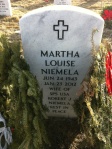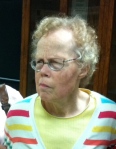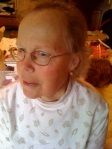First big family event after
My mother’s death:
My little brother got married.
Doug’s now-wife,
The incomparable Sarah,
Had come into our family
Three months before our mom
Died of Alzheimer’s.
Unfazed by the
Slow-burn trauma
Our family was slogging through
At the end of Mom’s
Long
Long
Illness,
Sarah plunged right in.
She and my brother exchanged
The giddy first Christmas gifts
Of their relationship
In the sick room where we
All had gathered.
No squeamishness,
No wariness,
Just a deep empathy,
And an intuitive sense of what
Needed to get done–
Meals cooked,
Thank you cards written after the funeral.
During those dreadful last months
Of my mother’s life,
There were flickers like
Lightning bugs of
Laughter and lightness and
Hope for the future,
And Doug’s relationship with Sarah
Was one of them,
And Sarah herself was another.
I carried in the palm of my hand a
Small, round picture of my
Mom and my brother
When Doug was probably about five,
His hair white blonde,
Sucking in his bottom lip the way
He used to as a child,
My mom in her late 30s–
Probably my age–
Pretty and happy to have her
Favorite little boy in her lap,
Looking slightly above the camera,
Expectant.
As we walked to the wedding together,
I silently showed the
Picture to my brother,
And we put our arms around each other
And he said,
“Thank you, Jen.
Thank you,”
Blinking tears.
I’m the one who cried for
Much of the ceremony,
Looking down into my palm
At the picture,
Or at the empty chair in the
Front row
Laid with a bouquet of yellow roses.
It was Mom’s little boy
Getting married,
The one she got to care for,
Who let her care for him,
Making sure he had flannel sheets
On his bed in the winter,
Patching up his
Favorite blanket over the years.
My brother gave
My mother the kind of
Motherhood she was suited for,
And now there he was,
Under a pure blue sky,
Starting on the next part of
His journey,
With Sarah.
With my mom, too
In a way,
But also very much
Without her.
Later at the end of the reception,
In the soft,
Other-worldly glow of the
Tent lights
It was me and a dozen or so of
Doug and Sarah’s friends left,
Dancing to an iPad playlist.
It was fun and wild and
Most people were pretty wasted and
Feeling the music in that
Drunken way
I remember
(or don’t remember).
There was my little brother and his
Wife,
Their friends gathered round and round,
Laughing and moving their alive bodies,
It was a joyful and sweet moment,
But what would’ve been just a
Tinge of nostalgia about
Change and
New life journeys
Was instead a wave of grief.
Our mother,
Doug’s mom,
Was dead.
She was dead.
Her ashes moldering in a
Cemetery 80 miles away.
And our lives progress on.
Grandchildren born and
Children married.
There will only be more and more
Events and even
People
She will have missed.
This: Doug and Sarah’s
Life together,
She won’t see it.
They won’t get the
Benefit of hearing her say,
“I’m so proud of you.”
And indeed,
For all of us young,
Laughing,
Healthy people
Dancing under the
Glowing tent,
This is our moment to be
Heedlessly alive in this world,
But it’ll pass.
We’ll die, too.
Grief,
I’ve learned,
Is a voluminous container that can
Simultaneously hold
Sadness and joy,
Bitterness and gratitude,
Fear and faith,
Pain and freedom.
And that night
Dancing with my little brother,
I was buffeted with them all.
It was almost
Too much to bear,
But as we do,
I bore it.
And I laughed,
And I cried,
And I danced,
And I cheered their dancing:
Doug and Sarah’s.













